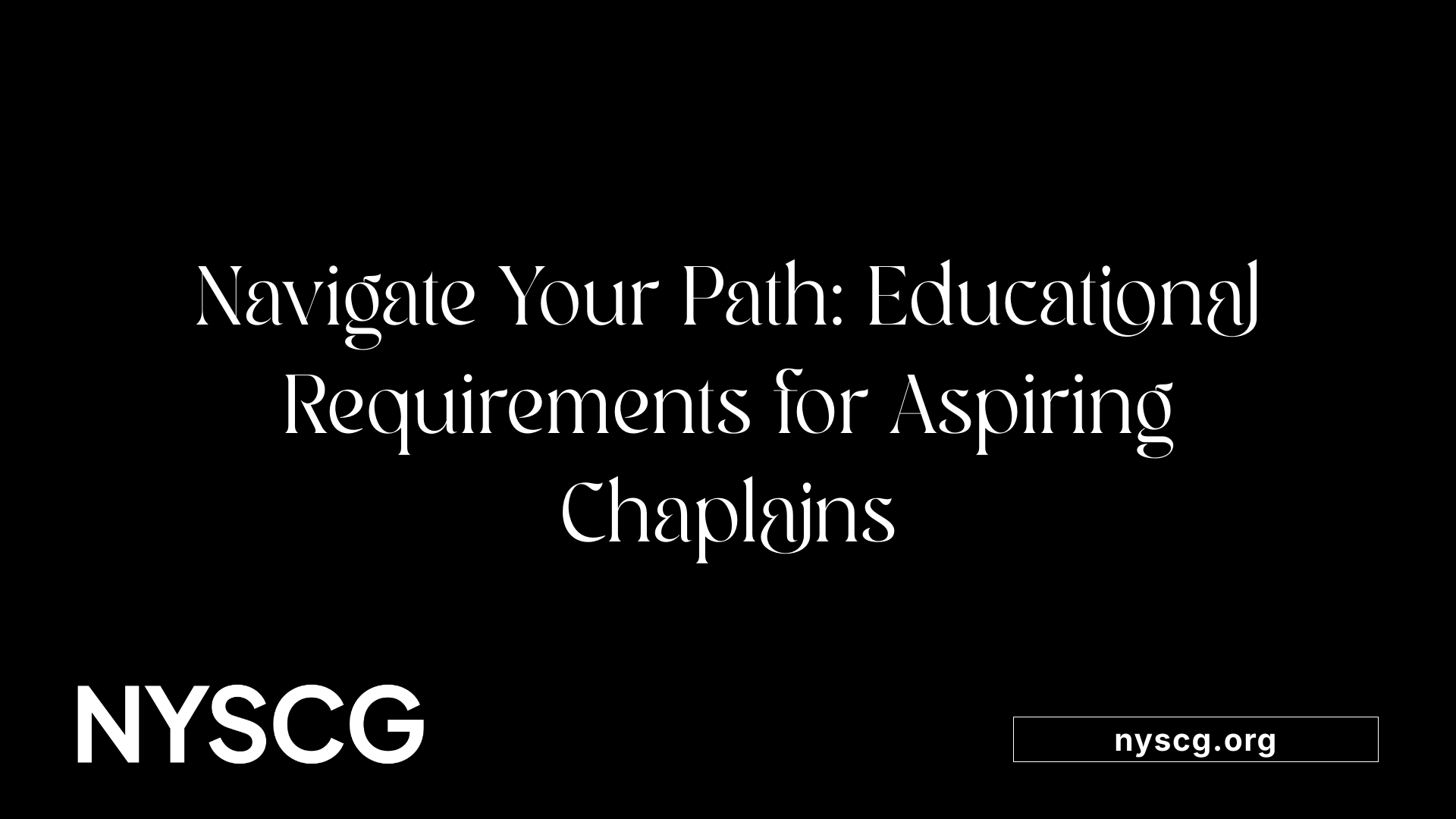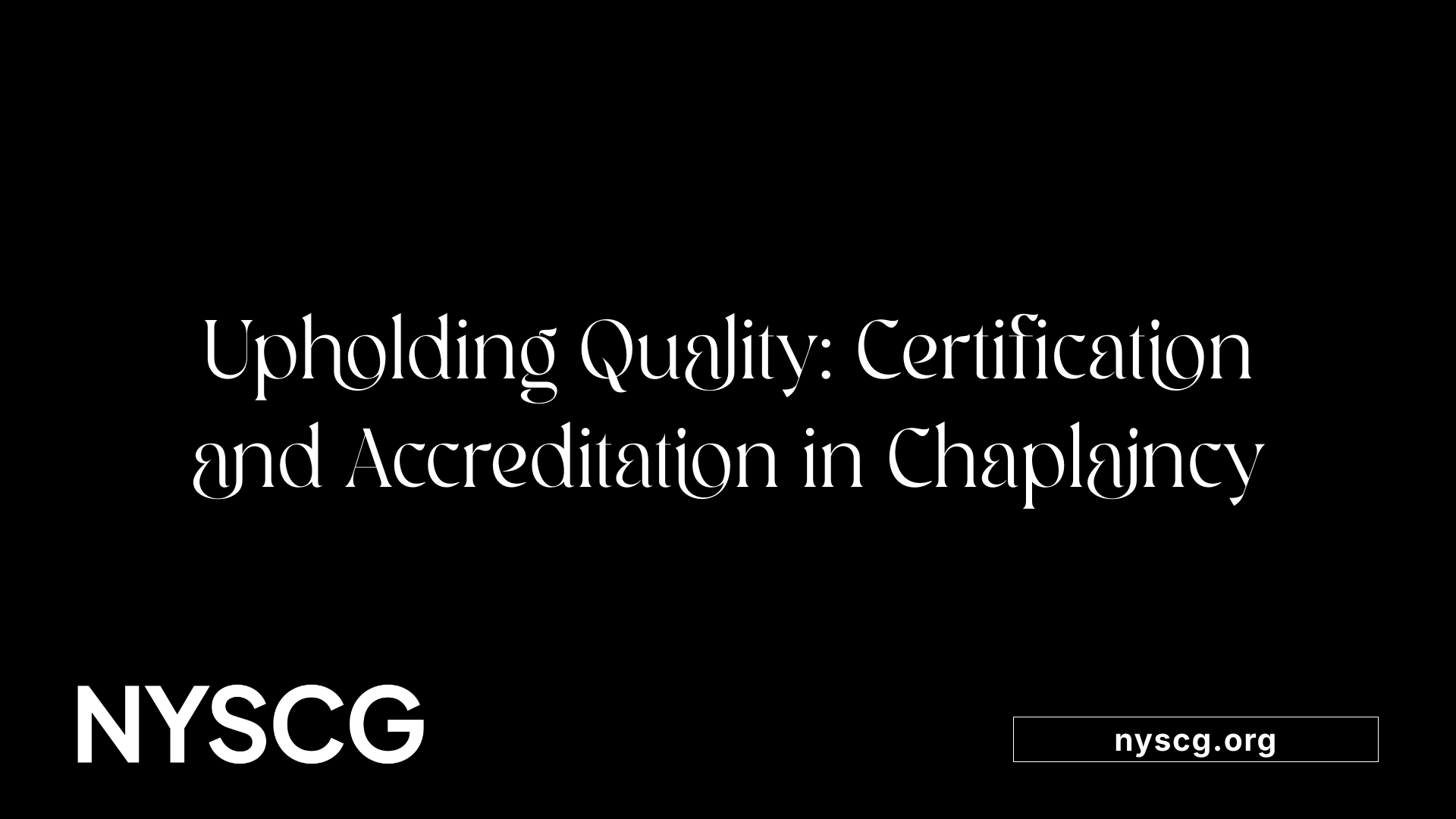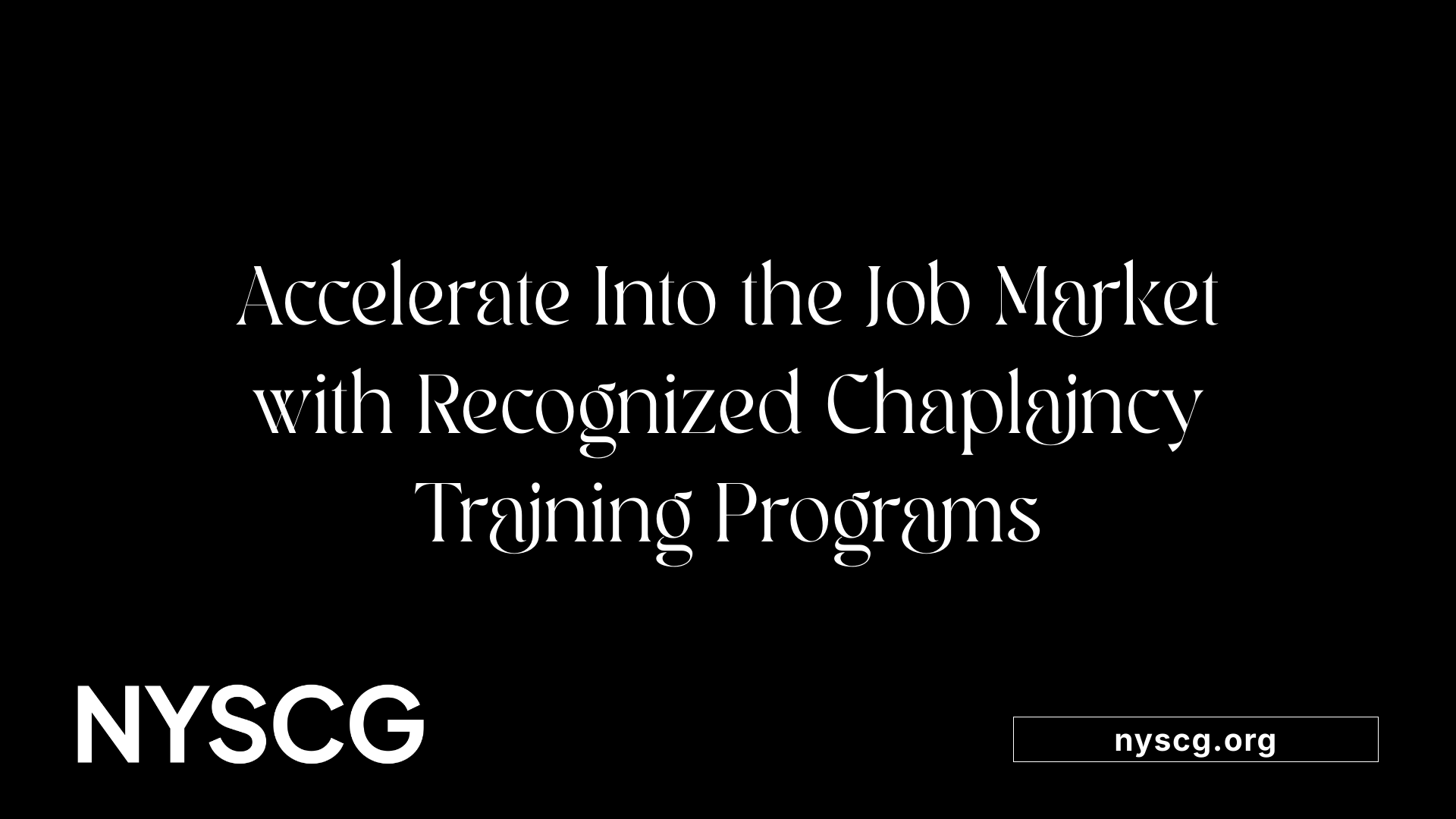How a One-Time Course Can Launch Your Chaplain Career


The field of chaplaincy offers a fulfilling career helping others in times of crisis, grief, and spiritual need. While traditional pathways often involve extensive education, certifications, and clinical training, a single, well-designed course can serve as a vital stepping stone. This article explores how a one-time chaplaincy course can open doors to meaningful service across diverse sectors, providing foundational skills and inspiring continuous growth in the profession.

Participants learn how to perform fundamental religious ceremonies like baptisms, funerals, or prayer services, which are often part of chaplain duties. These skills build confidence and prepare individuals to serve in diverse environments such as hospitals, prisons, or corporate settings.
Moreover, a one-time course offers a valuable self-assessment opportunity. It helps aspiring chaplains understand their interest in the field, gauge their aptitude for counseling or spiritual leadership, and determine if pursuing further education or certification aligns with their goals.
Building credibility is another benefit. Completing an introductory course demonstrates a commitment to the profession and can open doors for networking opportunities, volunteer placements, or entry-level positions.
While the course alone does not grant full certification or advanced qualifications, it lays a solid foundation for future growth. Many chaplains start with this initial step and then pursue additional training, such as Clinical Pastoral Education (CPE), or academic degrees, to deepen their expertise.
In conclusion, a single chaplaincy course can ignite passion, establish basic competency, and serve as a springboard into a lifelong journey of supporting others through spiritual and emotional care.

Taking a short chaplaincy training course offers several immediate advantages for aspiring chaplains. Participants gain practical skills that are directly applicable in real-world settings, such as crisis intervention, spiritual care, and understanding legal and ethical considerations. These skills can be highlighted on resumes, making candidates more attractive to employers in sectors like healthcare, military, and community services.
Additionally, short courses provide valuable networking opportunities. Enrolling in classes—whether online or in person—introduces students to experienced professionals, faculty, and fellow trainees. This connection can lead to mentorship, job referrals, and ongoing professional support.
Furthermore, such courses help individuals understand the varied roles chaplains serve in different environments—from hospitals and prisons to military bases and corporate offices. This overview aids in clarifying career interests and informs future education pathways.
However, short courses also have limitations. They often lack the comprehensive curriculum necessary to cover all aspects of chaplaincy, such as in-depth theological training or extensive hands-on experience. Since transitions into chaplaincy usually require additional certifications, supervised residencies, or advanced degrees, short courses serve best as introductory steps.
In conclusion, while these courses can jumpstart a chaplaincy career by providing foundational skills and initial exposure, ongoing education, practical experience, and certifications remain essential for long-term success. They are a valuable component of professional development, but not a standalone solution for fully qualified chaplains.

Becoming a chaplain through short courses is an accessible way for individuals interested in entering the field, but these programs usually serve as foundational or supplementary steps rather than comprehensive qualifications. One notable example is Denver Seminary’s Certificate in Chaplaincy, which is an intensive one-year program worth 15 academic credits. This program includes a clinical component accredited by the Association for Clinical Pastoral Education (ACPE), giving students hands-on pastoral experience.
In addition to academic coursework, organizations like I.F.O.C. provide shorter training modules that focus on specific aspects of chaplaincy such as crisis intervention or spiritual care. These courses often include in-person or online training, culminating in a certificate or license that signifies basic competence in chaplaincy skills. Completing background checks and obtaining recommendations may be required to earn these credentials.
However, these brief courses typically do not meet the full requirements for certification or employment in most professional settings. Most full chaplaincy roles, especially in healthcare, military, or institutional environments, demand a higher level of education, such as a Master of Divinity (MDiv), Master of Theological Studies (MTS), or related advanced degrees. Moreover, completing multiple units of Clinical Pastoral Education (CPE) is often a prerequisite for obtaining certification from organizations like the Association of Professional Chaplains (APC).
In summary, short courses are valuable for gaining initial knowledge, developing skills, and exploring the calling to chaplaincy. Still, they are generally not sufficient to replace comprehensive education and clinical experiences necessary for full certification, licensure, or professional practice in many chaplaincy settings.
**More information on educational requirements for chaplaincy can be found by searching for 'Educational requirements for chaplaincy' online, which provides resources and detailed pathways to enter the profession.

A short-term or one-time course can serve as an important step towards entering chaplaincy by providing foundational skills such as counseling, spiritual support, and worship leadership. These courses often cover essential topics aligned with organizational requirements, which helps individuals meet initial criteria for chaplaincy roles in diverse settings like hospitals, military, or community organizations.
Participants learn about the core responsibilities of chaplains, including crisis intervention, ethical considerations, and cultural sensitivity. This prior knowledge is valuable when applying for entry-level positions or internships, making candidates more competitive.
Many organizations recognize certificates from these courses, which can be a prerequisite for employment. For example, courses in crisis intervention, trauma response, or spiritual care prepare individuals for certification processes like those from the Association of Professional Chaplains.
Such training also introduces vital interfaith and ethical principles, crucial when working in diverse environments. While longer degrees or comprehensive clinical training are needed for advanced roles, short courses lower the barrier to entry by equipping aspiring chaplains with critical skills and awareness.
In summary, these courses are an accessible, flexible way to gain practical knowledge that aligns with employer expectations and certification standards, paving the way for a broader career in chaplaincy.

The field of chaplaincy relies heavily on rigorous standards of quality and professionalism, which are upheld through various accreditation bodies and certification programs. Accreditation organizations such as the Accreditation Commission for Education in Nursing (ACEN) or recognized universities like Heidelberg University and Manna University play a vital role in validating the quality of educational programs, including specialized courses and training modules. These bodies ensure that programs meet strict academic and training criteria, often granting academic credits or continuing education units (CEUs) that add value for students.
Certification pathways are available through prominent organizations such as the Association of Professional Chaplains (APC), the National Association of Catholic Chaplains (NACC), and the National Association of Jewish Chaplains (NAJC). These organizations assess individual chaplains based on educational background, clinical experience, ongoing education, and adherence to ethical standards. Gaining certification from these bodies signifies a high level of competence and commitment to professional practice.
This dual system of accreditation and certification helps maintain high standards across the profession. Accreditation of training programs assures prospective chaplains that their education meets established benchmarks. Meanwhile, individual certification demonstrates that a chaplain possesses the skills, knowledge, and ethical grounding necessary for effective spiritual care.
Certain courses and training modules are also recognized by academic institutions and professional bodies, ensuring that participants receive credible and valuable education. Many courses offer opportunities for academic credit or CEUs, which are important for professional development and career advancement.
In summary, accreditation and certification work together to ensure that chaplains uphold integrity and quality in their work, fostering trust among employers, faith communities, and those they serve. This system not only facilitates professional recognition but also guarantees that chaplains are properly equipped to meet the diverse spiritual needs of individuals across various settings.

Several short-term training programs serve as entry points for aspiring chaplains. One prominent example is the I.F.O.C. Chaplaincy Training Course, an accredited 40-hour program that can be completed either online or in person. This course is suitable for Emergency Service Personnel, Law Enforcement Officers, industrial workers, and others interested in chaplaincy. It covers essential topics such as Critical Incident Stress Management, Spiritual Care, Depression, Grief and Loss, Post-Traumatic Stress Injury, Human Trafficking, Trauma, and Suicide Interventions. Successful participants receive recognition from institutions like Manna University and Heidelberg University, which also offer continuing education credits (CEUs) for the training, facilitating ongoing professional development.
In addition to the I.F.O.C. Program, Clinical Pastoral Education (CPE) serves as a core clinical training option for those seeking a healthcare chaplaincy career. Typically lasting a year, CPE involves placements in hospitals and other clinical settings, with supervised coursework focusing on practical skills like pastoral counseling, crisis intervention, and ethical decision-making.
Military chaplain candidate programs are also a structured pathway into the field. These programs require candidates to have at least a bachelor's degree and often include specific military training components, such as the Chaplain Basic Officers Leadership Course (CH-BOLC). These programs offer practical experience, mentorship, and educational resources tailored to military spiritual support roles.
For those focusing on workplace or community chaplaincy, specialized training courses are offered by organizations like Marketplace Chaplains. These programs emphasize pastoral skills pertinent to secular environments—such as workplace counseling, spiritual support in community settings, and developing rapport with diverse populations. Often delivered through short courses or certification programs, these trainings prepare individuals for ministry outside traditional religious contexts.
Finally, many of these programs are developed in partnership with academic institutions and recognized professional organizations, ensuring that the training meets industry standards and provides pathways for further education, certification, and career advancement.

Starting with a one-time chaplaincy course introduces individuals to the wide range of environments where spiritual care is needed. Whether in hospitals, prisons, military contexts, or community services, early training provides insight into different roles and responsibilities. Many courses, especially online offerings, include modules that highlight these diverse settings, encouraging learners to explore areas of particular interest.
Continual learning is vital in the field of chaplaincy. With evolving social issues, legal regulations, and cultural dynamics, ongoing education helps chaplains stay current and competent. Advanced certifications, specialized workshops, and leadership development programs further enhance expertise, allowing professionals to expand their influence and effectiveness.
A single course often serves as a platform to connect with experienced chaplains and peers, forming a valuable professional network. Many programs encourage mentorship, which can provide guidance, practical advice, and support throughout a chaplaincy career.
Building relationships through coursework and related activities opens doors to job opportunities, internships, and collaborations. Membership in professional organizations such as the Association of Professional Chaplains or the Chaplaincy Innovation Lab can facilitate ongoing mentorship and access to resources, conferences, and certifications.
Initial courses lay the groundwork for pursuing higher credentials, including certification from recognized bodies like APC or the National Association of Catholic Chaplains. Such certifications often require additional supervised experience and CPE units, but a solid foundation built early on makes navigating these pathways smoother.
With experience, chaplains can progress into leadership positions, supervisory roles, or specialized fields like healthcare or military chaplaincy. Training programs (online or in person) can be aligned with long-term goals, progressively leading individuals toward roles of greater responsibility and influence.
Choosing a course that aligns with long-term aspirations is crucial. For example, aspiring hospital chaplains should focus on courses covering healthcare ethics, crisis intervention, and pastoral care. Conversely, those interested in military chaplaincy might seek programs emphasizing ethics, legal matters, and cross-cultural communication.
Many initial courses are designed to be flexible, allowing students to tailor their learning paths based on their interests and career objectives. Supplementing a basic course with targeted training ensures preparedness for specialized roles and advancements.
In summary, a single chaplaincy course can be an effective starting point, especially when complemented by ongoing education, networking, and strategic career planning. This approach fosters long-term growth, helping aspiring chaplains develop into well-rounded professionals dedicated to serving others across various contexts.
While a single chaplaincy course can seem like a modest investment, its potential to ignite a lifelong calling and serve as a foundation for advanced education and certification is substantial. Aspiring chaplains should view such courses as gateways—opportunities to acquire core skills, gain confidence, and explore their calling. Coupled with networking, ongoing learning, and real-world experience, these courses can propel individuals into meaningful careers dedicated to supporting others across various settings. The path to becoming a chaplain is both accessible and rewarding, with short-term training acting as a crucial first step toward making a lasting difference in people's lives.
All you need is the will to make the world a better place.
New York State chaplain group inc. is a tax deductible organization with a federal tax Id number 92-383-4921